Living in Jordan
For investors, business owners, employees, and entrepreneurs looking to embrace the wealth of opportunities in Jordan, the country offers a dynamic and stellar quality of life that is notable for its idyllic climate, modern facilities and amenities, rich local culture and hospitality, and a delightful blend of tradition and modernity. Jordan is an exceptionally safe, secure, and stable country, and foreigners living in the country find no trouble adapting to the warm, laid-back way of life.
Life in the Capital of Amman
Jordan’s capital city of Amman is the Kingdom’s thriving hub for social, political, economic, and cultural life. With a population of 2.2 million, Amman is a thoroughly modernized city that is intricately interwoven with iconic historical landmarks and cultural wonders.
Amman boasts a lively cultural scene, with no shortage of events, festivals, concerts, exhibitions, museums, and galleries. The city also offers an exceptional and highly diverse culinary landscape, as well as a thriving nightlife scene, offering something for all tastes and interests.
The city’s topography is remarkable for its rolling hills and sweeping vistas, with panoramic views of limestone-façade buildings, modern skyscrapers, ancient ruins, and lush greenery. These hills and valleys serve as natural borders for Amman’s various neighborhoods and districts.

Cultural Heritage & Diversity
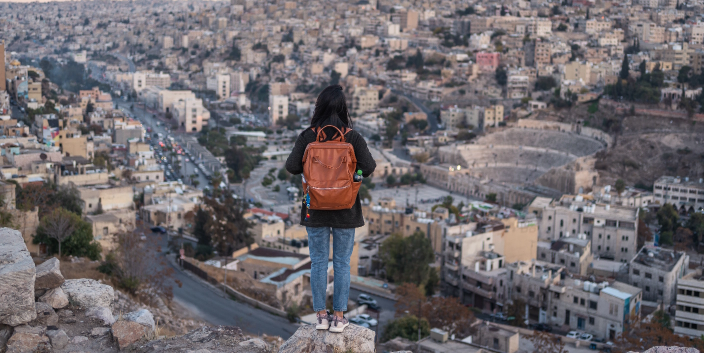
Jordan’s culture is a delightful blend of tradition and modernity, and the metropolitan capital of Amman has rapidly become one of the most sophisticated cities in the Middle East.
Most of the population has origins in either Jordan or Palestine, but the country continues to diversify, owing in large part to the fact that Jordan has always been a safe, welcoming destination for refugees and immigrants from across the Middle East and beyond. This mélange of backgrounds has woven a rich tapestry of cultural traditions that makes Jordan a dynamic place to visit, work, and live.

In Amman, and across many of Jordan’s larger cities, people tend to embrace East and West Culture, tradition, and modernity. Foreigners visiting Jordan will generally feel comfortable dressing in their usual attire, although, out of respect for more rural communities, it is recommended to dress a bit more conservatively (in looser clothing, with legs and shoulders covered) when traveling outside of Amman.

Jordan is a religiously tolerant and diverse society: although most of the Jordanian population is Muslim, there are also many other faiths practiced in the Kingdom, such as Christianism, which is spread across various sects, including Greek Orthodox, Roman Catholic, Syrian Orthodox, Coptic Orthodox, and various Protestant sects, among others. Jordan holds religious and spiritual significance to members of various faiths and religious backgrounds, and the country is home to many pilgrimage sites for Muslims and Christians alike.
Above all, Jordanian culture is underpinned by exceptional warmth and hospitality at every turn. There
is a genuine and heartfelt desire to welcome and take care of guests, and visitors are always amazed by
the kindness, openness, and generosity of the population.
Schooling & Education
Foreigners living in Jordan will find a wealth of options for providing their children with a high-quality education. The Kingdom boasts a number of international schools that adhere to various international curricula, from American, British, and French educational models to international baccalaureate, to Montessori schools and beyond.
In addition to an impressive selection of international day schools, Jordan is also home to King’s Academy, a world-class boarding and day school located in Madaba. Jordan is also home to over 30 public and private universities, offering accredited degrees across a wide array of specializations, including in high-demand STEM fields.

Local Cuisine & Culinary Scene
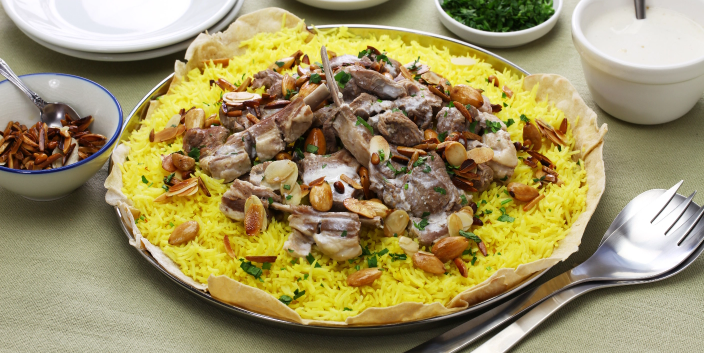
Jordanian cuisine represents the best of Levantine culinary traditions, while also incorporating the culinary traditions of many immigrant populations. The Kingdom’s cuisine shares many commonalities with neighboring and nearby countries like Palestine, Syria, and Lebanon. These include things like traditional mezzeh, as well as dishes like hummus, falafel, shawarma, and more.
Food plays a central role in the expression of hospitality and generosity, and guests will often be offered food and drinks within moments of entering a person’s home. The national dish in Jordan is mansaf, a meal that combines slow-cooked lamb with rice and then topped with jameed, a dried, fermented yogurt that is then reconstituted in water to create a salty, savory sauce.
Other popular dishes include maqloubeh, which combines rice with chicken and various vegetables like eggplant, cauliflower, and potatoes; msakhan, a savory meal with chicken, onions, and sumac; and mahshi, vegetables of various kinds filled with rice and meat (most commonly zucchini and grape leaves).
In Amman, visitors and residents will find an exceptional and highly diverse culinary scene. A comprehensive array of international cuisines, served at a high standard of quality and taste, can be found throughout the capital. Both fine dining and affordable eats can be found in abundance.


Mobile & Internet Services
Jordan boasts exceptional high-speed mobile and internet connectivity and coverage across all corners of the Kingdom. There are three main internet and mobile service providers in the country—Zain, Orange, and Umniah—all offering competitive rates and offers on a comprehensive range of services and solutions. The mobile network penetration rate is exceptionally high—at 99 percent—with wide-reaching 4G coverage. Local telecom operators have recently begun rolling out 5G services throughout the country as well.
Banking
The banking sector in Jordan is among the most developed in the region, upholding the highest global standards for customer service and innovation, and demonstrating resilience and stability. Currently, there are more than twenty banking institutions, classified into commercial and Islamic banks. The banks are well regulated by the Central Bank of Jordan and adhere to the latest international industry norms, with free capital mobility in Jordan since 1997.
The banks offer an extensive range of services and banking solutions, including robust digital banking options aligning with the best international standards. Branches and ATMs are conveniently accessible throughout the country, and businesses in Amman widely accept card transactions.

Shopping & Entertainment
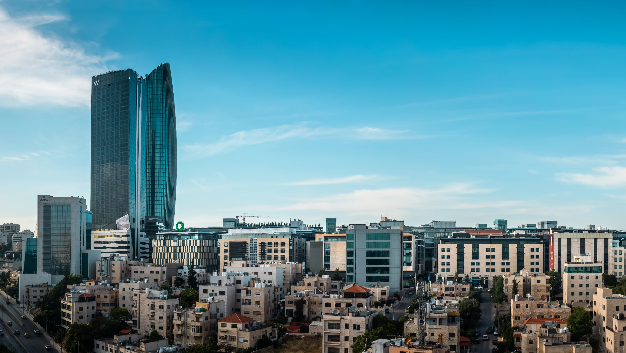
Amman’s shopping districts and facilities and integrated into neighborhoods and communities across the city, ensuring that residents are always in close proximity to whatever goods or services they may desire. In addition to a large number of hypermarkets throughout the capital (the most popular of which include Safeway, Carrefour, and Cozmo), smaller supermarkets and shops can be found in abundance. There are also numerous mobile applications and services that offer delivery of everything from groceries and food to flowers and electronics.
Amman is home to an abundance of modern malls and shopping centers, including TAJ Lifestyle Center, City Mall, Mecca Mall, Abdali Mall, and Swefieh Village—among countless others.


For more traditional shopping experiences, many residents head to Downtown Amman, where visitors can find a variety of authentic markets and souqs offering everything from fresh produce and homemade food products to clothing, to gold and souvenirs. The largest weekly market in Amman is the “Souq Juma’a,’ or Friday Market, which is hosted in an open-air setting in the Ras Al-Ain district, near downtown.
In recent years, the newly developed downtown district of Abdali has become one of the city’s most dynamic upscale areas for shopping, dining, leisure, entertainment, and living, offering an integrated and highly diverse destination for visitors and residents alike.

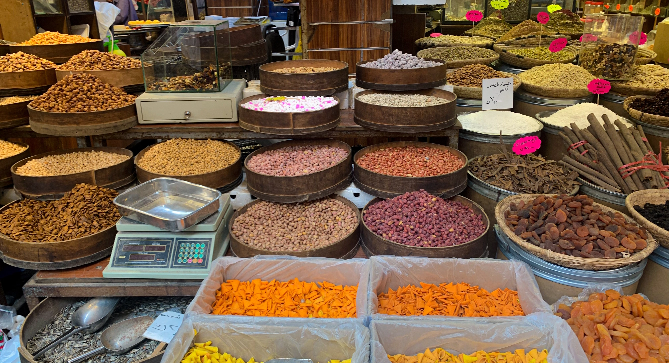
Residents of Amman will find no shortage of activities to keep them entertained. From cinemas to sporting and recreational facilities, the city is filled with entertainment destinations, offering engagement for adults and children alike. Those seeking leisure and wellness activities and escapes will also enjoy an array of world-class spas, gyms, hotels, salons, and therapeutic destinations and facilities, both inside Amman and outside the city.
Healthcare
Jordan’s healthcare system is consistently recognized as one of the best in the region—and globally.
The country continues to hold its position as one of the top medical tourism destinations in the world. There are numerous high-quality public and private hospitals located in strategic areas across the city, offering a comprehensive array of medical services provided by highly qualified, experienced medical professionals—many of whom have received training, degrees, and credentials for world-class medical institutions across the globe. Medical clinics, laboratories, and doctor’s offices—from general practice to specialized medicine—can typically be found in close proximity to major hospitals.

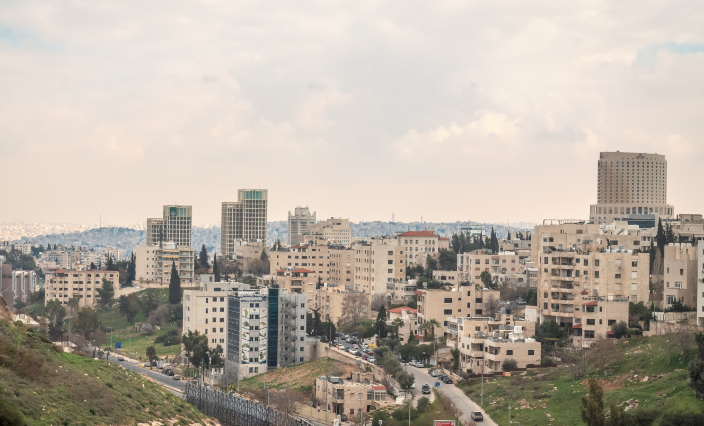
Weather
Jordan is one of the sunniest countries on earth, boasting more than 310 days of sunshine each year. The weather is almost exclusively dry and sunny from May to October, when there is hardly any rainfall. Winters are mild, with a fair amount of rainfall and occasional snowfall. Summers in Amman are warm but pleasant, thanks to the low humidity and moderate elevation, with daytime temperatures averaging about 32°C. Nights are almost always cool and pleasant. In the lowlands of the Jordan Valley, summers can be very hot, with temperatures reaching into the low forties (Celsius).
The weather in the south of Jordan, including the coastal city of Aqaba, is generally warm year-round, with temperatures similar to the Jordan Valley, but with less rainfall than in the northern parts of the country. The desert of Wadi Rum has a unique climate distinct from the rest of southern Jordan. Lying on a plateau around 900 meters above sea level, the Wadi Rum desert has limited vegetation, with hot summers and cold winters.
Transportation & Logistics
Getting around Jordan—and Amman in particular—is very easy, with numerous transportation options. The country boasts well-paved roads, including multiple highways that provide access to destinations throughout the Kingdom.
Many long-term residents and citizens choose to either rent or purchase a vehicle, and many international driving licenses are accepted as valid, while the process of attaining a Jordanian driver’s license is also quick and easy. Petrol stations are abundant and strategically located both inside and outside Amman, and there are a rapidly growing number of charging stations for electric vehicles throughout the country.
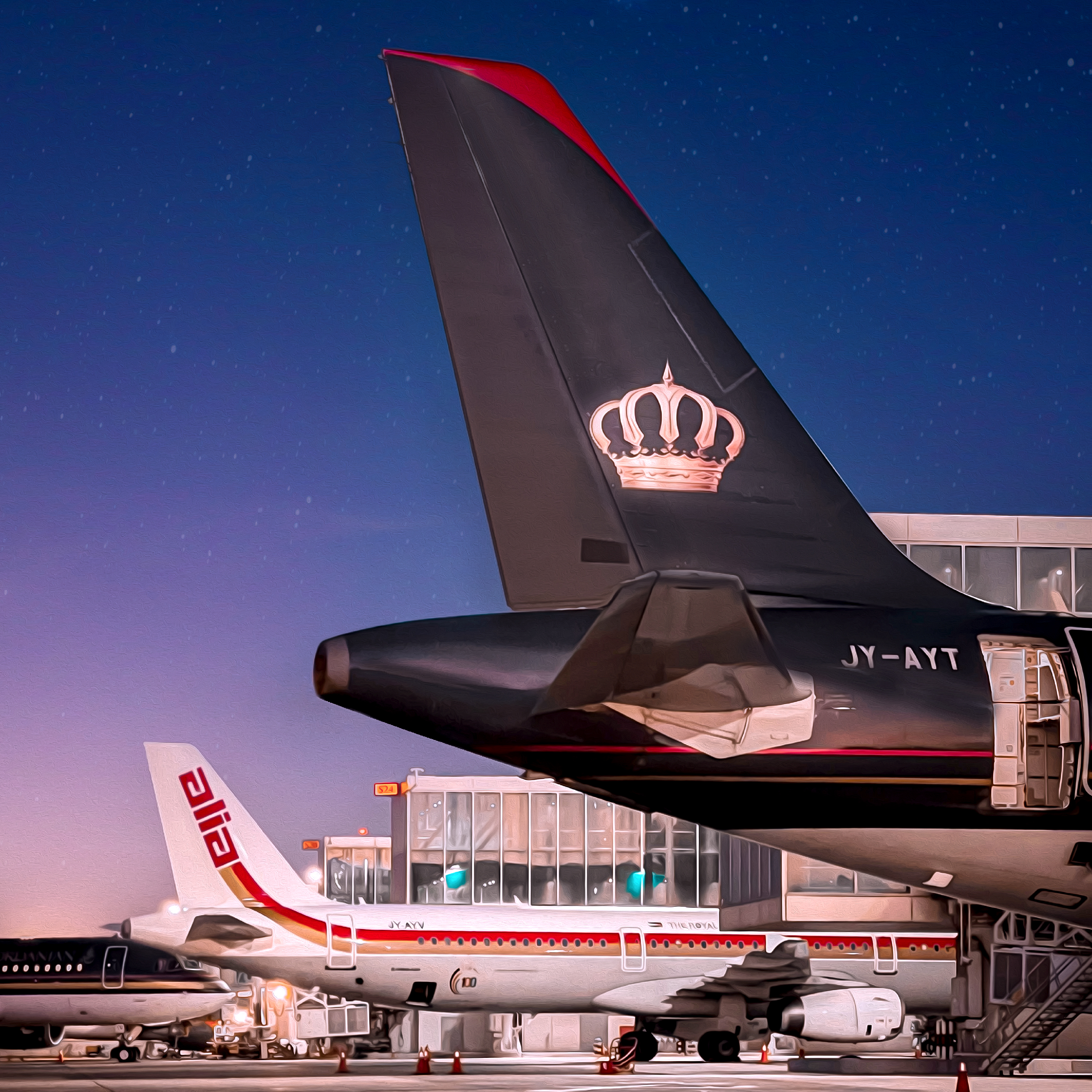

Many residents also choose to use the various public transportation options available to them. Taxis are a convenient and inexpensive option for getting around in any city. There are two main types of taxis in Amman: the white ‘service taxis’ are a shared taxi service, and typically operate along a fixed route for a very low cost. Yellow taxis are private taxis, and passengers are charged according to a metered price. These yellow taxis can be hailed from anywhere in the city—especially on major streets and thoroughfares, and outside popular commercial areas, such as shopping centers, hotels, and more.
There are also a number of ride-hailing applications and services operating across major cities throughout Jordan. These include international apps like Uber and more regionally popular alternatives like Careem, both of which provide quick, affordable transportation.
Jordan also has several different bus services and networks. In Amman, the Bus Rapid Transit (BRT) network connects passengers to strategic locations across all corners of the city—and the BRT’s recent expansion efforts have enhanced the access and quality of the local bus services.
There are also a number of bus and minibus services that connect passengers traveling between cities across Jordan. Minibuses can be easily found at all major bus terminals, while companies like JETT also offer reliable services between major destinations throughout the country.
Individuals traveling between Amman and Aqaba will also find affordable, daily flights between Amman’s Queen Alia International Airport and Aqaba’s King Hussein International Airport. Both of these airports also offer connections to a large number of international destinations.
Jordan is also home to a civil airport, in Marqa, that operates 24 hours a day. The country’s major port in Aqaba provides a key logistics terminal for the country, as well as a separate passenger terminal. The Aqaba port is utilized by a large number of international shipping lines, as well as several major cruise lines.